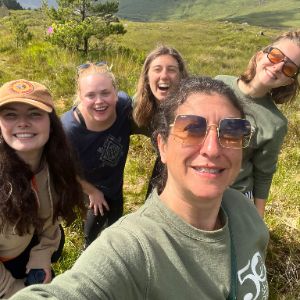I am blessed that because of my job, I get to work alongside secondary school students but also the hospitality industry workers, through our Hospitality programmes.
As an educator, I've always been aware of my own shortcomings. With English being my second language, I've always felt my languag...
I am beyond privileged that my weekly work allows me to meet Hotel teams from all over the world.
There is nothing more satisfying than one of your students surpassing your expectations!
This was exactly the case when I met the team at the Kingsley Hotel in Cork, Ireland. They have recently availe...
It is no secret that Climate Change is the biggest threat to our planet in modern times.
The irony of this colossal problem, is that more than likely it will not be the “adults” of this generation that will suffer the worst effects and consequences, of the current broken systems for safeguarding ou...
The Irish times has published an article entitled “Five trends in Green Finance”. It states that:
“The European Commission published a statement this year estimating that 42 per cent of corporate websites contain “exaggerated, false or deceptive and could potentially qualify as unfair commercial pr...
A question a lot of us cannot help but ask ourselves – how do I compare to others?
It is no different when it comes to a business; in fact, the competition gets steeper.
As we work with more and more hospitality businesses to get them started on their Green Journey, this same question continues t...
Last week I was invited to speak at the Hospitality & Tourism Expo organized by the Restaurants Association of Ireland.
When I finished my presentation the audience and I had an opportunity for a quick Q&A, with one questions coming up several times:
How can I get my team to engage with Green Acti...
Human’s relationship with food is a theme that has haunted me for the past couple of years.
Why such a strong reaction do you ask? Primarily because I feel that our relationship with food and our current systems to produce it and feed the population are disconnected and broken, causing major degrad...
The Irish Times has published an article titled:
Food & Drink companies facing mandatory emission targets.
The article starts by saying:
“All major Irish food and drinks companies will in future have to commit to reducing carbon emissions if they are to be part of Origin Green – the national s...
Last month, we were delighted to officially launch our environmental education programme for secondary schools here in Ireland.
Since the launch, we have been lucky to engage with these students and create a space where we encourage them to ask us anything that may be causing anxiety in regards to ...
In last week’s blog I spoke about personal accountability when it comes to Climate Change.
Link to Blog; https://www.fiftyshadesgreener.ie/blog/climate-change-why-personal-responsibility-matters
I also shared my own story of how I became empowered to start doing something about Climate Change my...
Last week I saw the amazing Clover Hogan, a young climate activist from Australia give a TEDTalk
The link to her talk is on this week's written blog on our website, I encourage you to watch it - it's fantastic!
“Climate change is not your responsibility, because it is outside your control, but w...
What statement is more impactful to you?
-
If you turn off your tap while brushing your teeth you will save water.
-
By turning off the tap while brushing your teeth, you and your family could save 14,600 litres of water every year! Imagine if every other home did the same?
...



